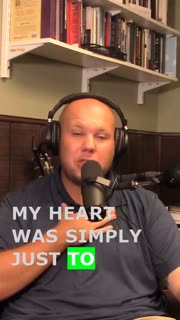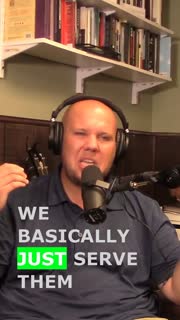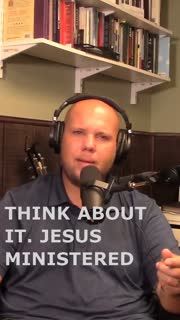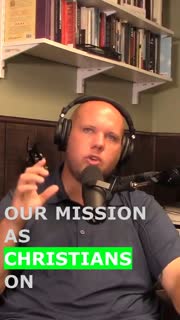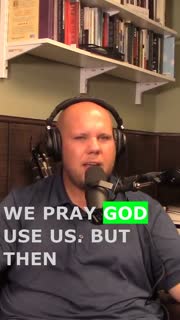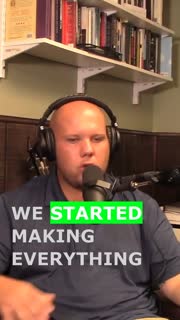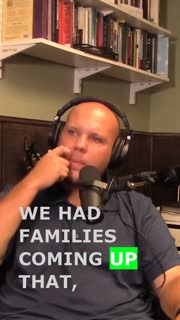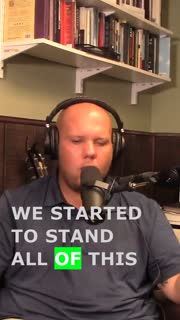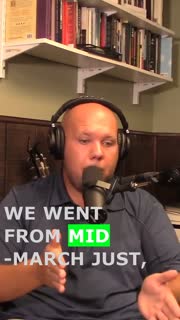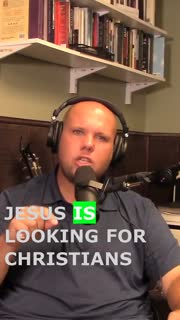Faithfulness and Transformation in Challenging Times
Devotional
Sermon Summary
Bible Study Guide
Sermon Clips
### Quotes for Outreach
1. "My heart was simply just to be honest and to share how we can tangibly be people that see change in our lifetime. And don't just continually see a need and just keep pushing it to the side and saying, man, that's just terrible what's going on. Or that's terrible when we read things in the news or we drive through inner cities. And we see communities that are just overwhelmed with poverty and so many different things." (24 seconds)
2. "We basically just serve them a meal and we love on them. We let them feel the dignity of what it is to be not just a human, but to be a child of God. And so we've been doing this for years, just serving people and loving on them right where they're at. And so they come in addicted and high homeless. We've got families that come in that need meals. And so this is a big way to just help out in their life." (21 seconds)
3. "Think about it. Jesus ministered to people universally. Like it didn’t matter their background to him. It didn’t matter where they were from. Didn’t matter what ethnic group it was, the need that attracted Jesus to them, the need, and that’s really what the Lord’s really been dealing with my heart over the past couple of months is getting back to the ground roots of the need is what should be drawing his church, his people, like when there’s a need we’re drawn to it." (33 seconds)
4. "Our mission as Christians on earth, because remember earth, we’re just passing through this place. Heaven is our eternal home. If you’re not a Christian watching today, maybe this podcast will get you thinking about eternity, but as a pastor and as a Christian, I understand this earth is just temporary. So what I have here on earth, isn’t necessarily just for me. It’s that the needs around me can, can be met. Does that make sense?" (31 seconds)
5. "We pray God use us. But then when he says, okay. Here’s the need, I need you to be used, we get mad, God, you know, the timings off God, you know, do you know my schedule right now? Like, come on, seriously, God, and God’s got to maybe scratching his head a little bit saying, I’m confused. You prayed, use me. So I’m trying to use you." (23 seconds)
### Quotes for Members
1. "We started making everything to go and it like it took off. We started opening up, staying open Tuesdays and Thursdays, serving right out the church door, obviously masked up and everything sanitized and safe, but still serving. And before long, we started meeting a whole new window of people, people from around our community that that were coming and saying, thank you. Thank you so much for staying open. Our kids normally would bring home food for our family, but all that got shut down. So thank you. And before long, what would normally be hundreds of people a week, we started to serve. Well, sorry, we used to serve hundreds of people a week. Now we were serving thousands of people. Yeah, that’s how drastic this change. See, when you pray for something, don’t be alarmed when God comes in a different way. But it’s really what you prayed for all along." (53 seconds)
2. "We had families coming up that, that were in tears. Think about this in tears. Cause they said, someone told them about our church soup kitchen being open and they were literally starving. Now, when I say literally starving, we think of like third world countries, but people literally in our inner cities are starving. You know, they’re addicted maybe to drugs, maybe families. We, we, we have Hispanic families that, that are, are, are from, you know, around the world. That, that come into the city of Baltimore and don’t speak much, much English and don’t know how to, you know, really adapt to living in the United States. And so a resource like what we have is a blessing to them. Cause even though the, the, the language gap is different, when you give someone a meal, that’s universal." (51 seconds)
3. "We started to stand all of this stuff going where we’re in the middle of the summer. Oh, well, sorry. The beginning of the summer and the food bank who was one of our big partners called us and said, Hey, um, we admire you guys staying open when no one else was staying open your community. You were the, the, the soup kitchen. You guys were running. Um, we really appreciate that. And so the lady on the phone said to honor your commitment. We’re going to serve the people in your community now, the food bank and a Christian organization. They’re a nonprofit, um, that has a couple of locations that basically supply food to nonprofits and churches and soup kitchens to help them keep running." (34 seconds)
4. "We went from mid-March just, just praying, God, we’re going to stay open. I feel the urge. We’re going to stay open. I would feel the call, not even knowing if we’re going to make it two months. And here we are months and months and months later, thousands of people serve, but now it’s overflowing from us that we’re blessing other nonprofits. We’re seeing God transform lives. And that’s why I want to just end today with just encouraging you. We’re in a wild season. We’re in a crazy season. We’re in what some would maybe even call a hopeless season to some degree, but the church of Jesus Christ has the hope of the world inside of them called Jesus." (40 seconds)
5. "Jesus is looking for Christians to step up to the plate in a season like this and be used to be used sometimes means you’re a bridge. And the cool thing about a bridge is it provides a lot of great scenery, right? If you’re driving, we have what we call the Francis Scott Key Bridge, which apparently right underneath the Francis Scott Key Bridge is where our national anthem was written. And it’s beautiful. You can drive over by the top of the peak of it. It’s beautiful. The harbor right over the water. I mean, it’s just gorgeous. But the thing about the bridge is if you’re going to desire to be used and be a bridge to help people find hope and healing in their life, it means people are going to walk over you. It’s going to be draining. It’s going to be tiring. It’s going to be times when it just feels like I just need to, I need the rest." (51 seconds)
Ask a question about this sermon
1. "My heart was simply just to be honest and to share how we can tangibly be people that see change in our lifetime. And don't just continually see a need and just keep pushing it to the side and saying, man, that's just terrible what's going on. Or that's terrible when we read things in the news or we drive through inner cities. And we see communities that are just overwhelmed with poverty and so many different things." (24 seconds)
2. "We basically just serve them a meal and we love on them. We let them feel the dignity of what it is to be not just a human, but to be a child of God. And so we've been doing this for years, just serving people and loving on them right where they're at. And so they come in addicted and high homeless. We've got families that come in that need meals. And so this is a big way to just help out in their life." (21 seconds)
3. "Think about it. Jesus ministered to people universally. Like it didn’t matter their background to him. It didn’t matter where they were from. Didn’t matter what ethnic group it was, the need that attracted Jesus to them, the need, and that’s really what the Lord’s really been dealing with my heart over the past couple of months is getting back to the ground roots of the need is what should be drawing his church, his people, like when there’s a need we’re drawn to it." (33 seconds)
4. "Our mission as Christians on earth, because remember earth, we’re just passing through this place. Heaven is our eternal home. If you’re not a Christian watching today, maybe this podcast will get you thinking about eternity, but as a pastor and as a Christian, I understand this earth is just temporary. So what I have here on earth, isn’t necessarily just for me. It’s that the needs around me can, can be met. Does that make sense?" (31 seconds)
5. "We pray God use us. But then when he says, okay. Here’s the need, I need you to be used, we get mad, God, you know, the timings off God, you know, do you know my schedule right now? Like, come on, seriously, God, and God’s got to maybe scratching his head a little bit saying, I’m confused. You prayed, use me. So I’m trying to use you." (23 seconds)
### Quotes for Members
1. "We started making everything to go and it like it took off. We started opening up, staying open Tuesdays and Thursdays, serving right out the church door, obviously masked up and everything sanitized and safe, but still serving. And before long, we started meeting a whole new window of people, people from around our community that that were coming and saying, thank you. Thank you so much for staying open. Our kids normally would bring home food for our family, but all that got shut down. So thank you. And before long, what would normally be hundreds of people a week, we started to serve. Well, sorry, we used to serve hundreds of people a week. Now we were serving thousands of people. Yeah, that’s how drastic this change. See, when you pray for something, don’t be alarmed when God comes in a different way. But it’s really what you prayed for all along." (53 seconds)
2. "We had families coming up that, that were in tears. Think about this in tears. Cause they said, someone told them about our church soup kitchen being open and they were literally starving. Now, when I say literally starving, we think of like third world countries, but people literally in our inner cities are starving. You know, they’re addicted maybe to drugs, maybe families. We, we, we have Hispanic families that, that are, are, are from, you know, around the world. That, that come into the city of Baltimore and don’t speak much, much English and don’t know how to, you know, really adapt to living in the United States. And so a resource like what we have is a blessing to them. Cause even though the, the, the language gap is different, when you give someone a meal, that’s universal." (51 seconds)
3. "We started to stand all of this stuff going where we’re in the middle of the summer. Oh, well, sorry. The beginning of the summer and the food bank who was one of our big partners called us and said, Hey, um, we admire you guys staying open when no one else was staying open your community. You were the, the, the soup kitchen. You guys were running. Um, we really appreciate that. And so the lady on the phone said to honor your commitment. We’re going to serve the people in your community now, the food bank and a Christian organization. They’re a nonprofit, um, that has a couple of locations that basically supply food to nonprofits and churches and soup kitchens to help them keep running." (34 seconds)
4. "We went from mid-March just, just praying, God, we’re going to stay open. I feel the urge. We’re going to stay open. I would feel the call, not even knowing if we’re going to make it two months. And here we are months and months and months later, thousands of people serve, but now it’s overflowing from us that we’re blessing other nonprofits. We’re seeing God transform lives. And that’s why I want to just end today with just encouraging you. We’re in a wild season. We’re in a crazy season. We’re in what some would maybe even call a hopeless season to some degree, but the church of Jesus Christ has the hope of the world inside of them called Jesus." (40 seconds)
5. "Jesus is looking for Christians to step up to the plate in a season like this and be used to be used sometimes means you’re a bridge. And the cool thing about a bridge is it provides a lot of great scenery, right? If you’re driving, we have what we call the Francis Scott Key Bridge, which apparently right underneath the Francis Scott Key Bridge is where our national anthem was written. And it’s beautiful. You can drive over by the top of the peak of it. It’s beautiful. The harbor right over the water. I mean, it’s just gorgeous. But the thing about the bridge is if you’re going to desire to be used and be a bridge to help people find hope and healing in their life, it means people are going to walk over you. It’s going to be draining. It’s going to be tiring. It’s going to be times when it just feels like I just need to, I need the rest." (51 seconds)
